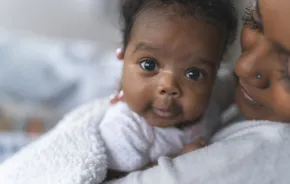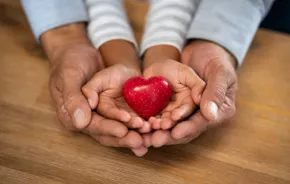 You swear you won’t do it — at least not in public. Then, when you have a little one, you suddenly find yourself speaking “baby talk” or “parentese,” using higher pitch, slower tempo and wider fluctuations in your intonation.
You swear you won’t do it — at least not in public. Then, when you have a little one, you suddenly find yourself speaking “baby talk” or “parentese,” using higher pitch, slower tempo and wider fluctuations in your intonation.
You’re not alone. This type of “infant-directed communication” is used by parents not just throughout the U.S., but also in countries around the world.
It turns out that when you talk the (baby) talk, you’re instinctively doing something great for your child. Although it is also important for your child to hear adult speech in order to develop vocabulary, “parentese,” or “baby talk,” plays a crucial role in her development of language and communication skills.
Researchers at universities such as Carnegie Mellon and the University of Washington report that babies not only pay much more attention when hearing parentese, but also appear to learn from it. Studies found that babies exposed to parentese learned words and developed language skills faster than babies who were not.
Experts feel this kind of communication adds emotion and feeling to words and language, making it easier for the child to understand what’s being said. While she doesn’t know what every word means, your baby may still understand — at least in general — what you are saying.
In fact, many of the things you may already be doing with your child are likely to be helping her growth in language and communication. “We have really good instincts as parents,” says Dr. Gina Lebedeva of the UW Institute for Learning and Brain Science (I-LABS). “A lot of science really reinforces those instincts.”
So when you hear your very young infant cooing and you repeat those sounds back to her, studies say that simple action not only teaches her sounds, but how the give and take of communication works. And when you teach her “Itsy Bitsy Spider,” your baby is learning about mirroring and taking turns, both stepping-stones to basic communication.
Communicating with your baby through gestures
Communication is not simply about sounds. According to studies conducted by researcher Susan Goldin-Meadow, a psychology professor at the University of Chicago, gestures also matter. Goldin-Meadow found a direct correlation between parents gesturing to their kids in infancy and the child’s later vocabulary. So even those silly faces you make can help your child learn, possibly long after you made them.
Symbolic play, such as pretending to drink imaginary juice, also increases cognitive skills and later, language development, according to a 1997 study published in the International Journal of Behavioral Development.
Reading also helps children develop language skills, particularly when parents point out objects in the book and ask their children questions about them. A University of Notre Dame study found that “shared parent-infant” reading to 8-month-olds translates into better language abilities at 14 months, especially for girls.
By helping your child actively “read” and letting her turn pages, point to pictures and flip through the book in any order, you make reading more child directed and interactive. That interaction helps her learn the basics of language and communication, says Lebedeva.
So, that cooing, reading, music and all those other fun things you do with your child help with her development. In fact, at this age, all play is learning. Worried you’re not doing it “right”? Relax. “It doesn’t have to be perfect,” Lebedeva says. And there’s no need to spend a fortune on educational toys. When it comes to helping your young child develop language and communication skills, says Lebedeva, “you are the best toy in the room.”
Kathryn Russell Selk lives, works, writes, and makes silly faces and noises with her 28-month old-daughter (and, sometimes, her 7-year-old son) in Seattle.











